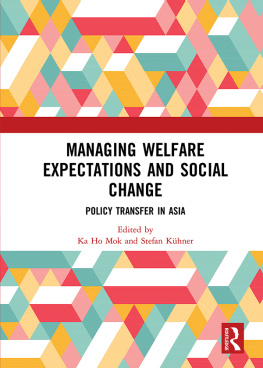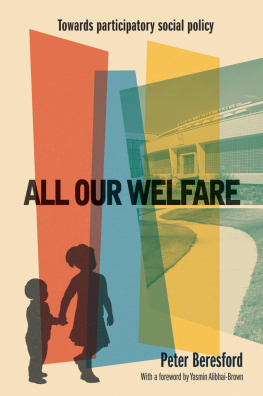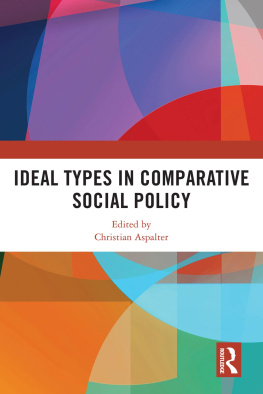Ideology and Welfare
Ideology and Welfare
Gary Taylor
Sheffield Hallam University
Gary Taylor 2007
All rights reserved. No reproduction, copy or transmission of this publication may be made without written permission.
No paragraph of this publication may be reproduced, copied or transmitted save with written permission or in accordance with the provisions of the Copyright, Designs and Patents Act 1988, or under the terms of any licence permitting limited copying issued by the Copyright Licensing Agency, 90 Tottenham Court Road, London W1T 4LP.
Any person who does any unauthorised act in relation to this publication may be liable to criminal prosecution and civil claims for damages.
The author has asserted his right to be identified as the author of this work in accordance with the Copyright, Designs and Patents Act 1988.
First published 2007 by
PALGRAVE MACMILLAN
Houndmills, Basingstoke, Hampshire RG21 6XS and
175 Fifth Avenue, New York, N.Y. 10010
Companies and representatives throughout the world
PALGRAVE MACMILLAN is the global academic imprint of the Palgrave Macmillan division of St. Martins Press, LLC and of Palgrave Macmillan Ltd. Macmillan is a registered trademark in the United States, United Kingdom and other countries. Palgrave is a registered trademark in the European Union and other countries.
ISBN-13: 978-0-333-92928-5 hardback
ISBN-10: 0-333-92928-4 hardback
ISBN-13: 978-0-333-92930-8 paperback
ISBN-10: 0-333-92930-6 paperback
This book is printed on paper suitable for recycling and made from fully managed and sustained forest sources.
A catalogue record for this book is available from the British Library.
Library of Congress Cataloging-in-Publication Data
A catalog record for this book is available from the Library of Congress.
10 9 8 7 6 5 4 3 2 1
16 15 14 13 12 11 10 09 08 07
Printed in China
Acknowledgements
I have benefited greatly from conversations with friends and colleagues. In particular, I would like to thank Anthony Arblaster, John Schwarzmantel, Tony Taylor, Malcolm Todd, Rob Sykes, Alan McGauley, Helen Hawley and the late Bob Pearson (I miss you Bob). My thanks also to Catherine Gray and the editorial team at Palgrave and to the anonymous referees for their comments, observations and critique. Finally, my family has been brilliant and patient in the extreme. Thank you Karen for reading and commenting upon the manuscript and for keeping our children entertained as I approached the deadline. Matthew and Laurie, I can play now.
1
Introduction
The aim of this book is to outline a variety of ideological perspectives on welfare and to consider how these ideas are reflected in a range of social policies. It is important to realise at the outset that ideas have an important part to play in setting the tone and defining the parameters of political activity and that when governments develop their policies they often do so within constantly changing ideological frameworks. Ideologies do not stand still, nor do they develop in isolation of the policies and debates engineered by governments. Ideologies develop as a result of successes and failures of government initiatives and in response to circumstances that can sometimes appear beyond the control of government. This book looks at ideological debates about the role of the state in tending to the general welfare of the citizens and concentrates, in particular, on the development of ideas and policies in such areas as the benefits system, housing, health care and education. Ideologies provide us with numerous interpretations of economic, social and political life. We can pose questions about who should be responsible for financing health care and to what extent the state should provide benefits, subsidise housing or provide education. It is often the case that the answers to these questions owe more to our ideological assumptions about the character of humanity than to distinct views on social issues. Each ideology has its own distinctive way of viewing human characteristics, of interpreting economic and social affairs, of considering the legitimate functions of the state and of challenging and changing the way we live. By looking at ideologies, we have access to a range of critical perspectives on contemporary society and a broad spectrum of possibilities for the future.
The nature of ideology
Ideologies are often thought to have descriptive and prescriptive features because they describe social reality and suggest ways to change it. Their descriptions of reality, however, will be formulated in accordance with the principles they value. Socialists, for example, have traditionally concentrated upon the effects of society upon the working class, whereas liberals are more likely to focus upon the rights and potential of the individual. The slant they place upon describing social reality thus provides a springboard for their proposals and a clue to their visions of how society should be. It is apparent that they only put forward solutions to the problems they identify and that a conservative vision of how society should be organised is not designed to remedy problems identified by liberals or socialists. In some ways, ideologies are attempts to create a self-contained vision of how society is and how it should be. Each ideology identifies a limited number of problems and a limited number of solutions. Whereas Marxists identify key problems with capitalism and look for ways to undermine what they consider to be an unjust system, conservatives will focus upon its strengths and seek to find ways to stabilise capitalism. The solutions offered by ideologies make sense only when considered alongside their views on existing society. It has been argued that the core of an ideology lies in its particular image of how society should be transformed. From this stems a practical programme that identifies what needs to be done to unite image and reality. Ideologies, therefore, provide us with a way of understanding and influencing the world in which we live (Eccleshall, 1984a, pp. 78). It would be wrong, however, to reduce any ideology to a simple wish list constructed by people discontent with the status quo. Some ideologies seek to preserve rather than to engage in radical change.
We can gain considerable insight into ideologies by uncovering their divergent views on the purpose of life, rather than by comparing policy recommendations on such issues as the state or the economy. Although it is important to understand practical proposals, those subscribing to different ideologies may well share some policy recommendations but for different reasons. Some conservatives, for example, are critical of the welfare state for sapping the will and initiative of the individual and for draining the nation of resources (see ). Given these vastly different agendas, it makes sense to view policy recommendations in the light of broader ideological structures.
The development of ideologies
Ideologies are developed in a variety of ways. At a basic level, people construct their own ideological makeups by developing their own philosophies of life. This is a process that might draw upon the ideas of others and one that is often driven by the need to place our own experiences into some broader context. We often draw conclusions about our nature and about the nature of other people in society. We also have economic views, relating perhaps to the work we do and to the incomes we have, even if these views do not run to detailed knowledge of macro-economic policy. Attitudes towards social policy likewise develop through our own experiences of the education and health systems, through the way we view our own housing needs and perhaps as a result of our own or our familys experience of the benefits system. The importance of this basic level of understanding should not be underestimated. Those who devour weighty theoretical texts may well dismiss such views as undeveloped or even as uninformed, but this fails to recognise the importance of such views in influencing the way we vote, moulding the formation of policy (particularly in a more pragmatic political climate) and in affecting the kinds of literature we choose to read. Ideological perspectives often have fairly simple foundations. They tend to rest upon a particular view of life, and one that can be heard in a variety of places and expressed by a broad range of people. It is not necessary to be an expert in politics to understand and appreciate the importance of ideas in society and to recognise the relevance of ideology.









